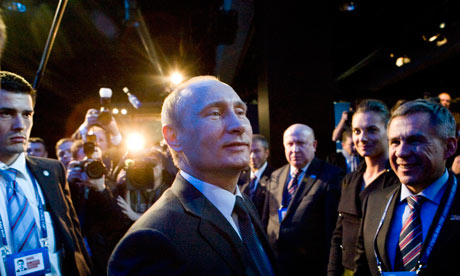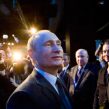
Russia Tries to Exploit European Disunity
Publication: Eurasia Daily Monitor Volume: 7 Issue: 217
By:

The big surprise that rejoiced the vast majority of Russians last Friday was the decision by the International Federation of Football Associations (FIFA) to hold the 2018 World Cup tournament in Russia. One person who did not appear surprised was Prime Minister, Vladimir Putin, who immediately arrived at the FIFA headquarters in Zurich, Switzerland to express his gratitude and give his assurance that the event will be staged “to the highest standards.” The bid for the privilege of hosting the World Cup was Putin’s initiative and it did not appear very strong in comparison with the three competitors: England, Spain and Portugal, and Belgium and the Netherlands (Rossiyskaya Gazeta, December 3). Yet Putin, who also played a key role in securing the decision by the International Olympic Committee to award the 2014 Winter Olympic games to Sochi, was supremely confident in his talents for lobbying and “selling” the bid with the best packaging (Kommersant, December 3).
Indeed, what distinguished Russia’s presentation was the honest admission that nothing is ready for an event of such global scale so that 15 stadiums in 13 cities, except Luzhniki in Moscow, will be built from scratch (Moskovsky Komsomolets, December 4). Dozens of hotels must be constructed, but the most expensive part of the preparation is upgrading the transport infrastructure, consequently the total cost is expected to exceed $50 billion (Vedomosti, December 3). It might appear nonsensical to commit to such expenses when the federal budget is already stretched with the investments in the controversial Sochi extravaganza, but Putin asserted that Russian “oligarchs” would be happy to pay their share (www.gazeta.ru, December 3). Shameless graft will enrich hundreds of bureaucrats, but the unique opportunity to see the best teams in the supreme competition is certain to be hugely popular among tens of millions of football fans.
There is, however, a particular twist to this triumph in what Putin described as a “tough and fair fight,” and it concerns his current assessment of European discord and faltering integration. Russia may have been hit by the economic crisis harder in terms of lost volume to its GDP, but the political consequences are far more severe in debt-saddled Europe. Indeed, the Russian leadership does not have to deal with student demonstrations ransacking party offices or with strikes paralyzing airports and railroads, and the protest rallies in regions like Kaliningrad are subdued with little trouble (Novaya Gazeta, December 1). Russian experts argue that looming insolvency of several smaller economies like Greece or Ireland could seriously undermine the cohesion of the Euro-zone, but at the same time strengthen the influence of Germany, which happens to be Russia’s key European ally (Ekspert, November 29; www.newsru.com, December 3).
This economic centrifugal momentum overlaps with security disagreements caused first of all by the inability to sustain the joint effort in Afghanistan. The well-propagated effort at reviving NATO boiled down at the Lisbon summit to the initiative for building a common missile defense system, which most Europeans see as irrelevant to their real security concerns. Moscow has concluded that joining this initiative is a surer way to sabotage it than direct opposition, but last week Putin and Medvedev argued in unison that failure to take Russia’s demands into account would lead to a new “arms race” (www.gazeta.ru, December 2). This threat might appear ridiculous given the continued degradation of the Russian defense industry, but it is addressed not to the US Senate, where the prospect for the ratification of the Prague Treaty is seen as poor and worsening, but to European “partners,” who are slashing their defense expenditures as if “world peace” has already arrived.
Security matters only insofar as Moscow can play safe on trans-Atlantic differences, but the real priority in Russian policy is energy, and here Putin is firmly set on exploiting every opportunity provided by European disunity. Visiting Berlin two weeks ago, he attacked the diversification policy of the European Commission as “robbery,” and last Friday he embraced his old friend Italian Prime Minister, Silvio Berlusconi, seeking to end misunderstandings on the South Stream pipeline project, which has the new price-tag of 15.5 billion Euros (Nezavisimaya Gazeta, December 2). Medvedev followed-up by visiting Warsaw on December 6 prior to participating in the EU-Russia summit on December 7, while the deal on selling more volumes of gas to Poland would strengthen the argument that the EU policy of subsidizing renewable sources of energy amounts to unsustainable protectionism (RIA Novosti, December 1; Kommersant, November 22).
The EU might indeed experience an introverted moment when internal spasms prevent it from pursuing a consistent policy in the “near abroad” from Turkey to Belarus but it does not mean that Russia is able to impose itself as its most privileged partner. Putin has outplayed the Europeans in football intrigues, but that will hardly help in securing an inflow of investment (www.gazeta.ru, December 3). The investment climate, as the successful entrepreneur, Petr Aven, recently confirmed, keeps worsening despite all the pledges to create incentives for modernization (www.newsru.com, December 3). In his interview on CNN with Larry King, Putin resolutely dismissed well-documented opinions that Russia had become a thoroughly corrupt and criminalized state, but he cannot expect that next week when the judge starts reading the verdict in the crudely fabricated case against Mikhail Khodorkovsky and Platon Lebedev, that Western leaders would be too busy with Christmas preparations (Nezavisimaya Gazeta, December 2).
One political consequence of the FIFA decision, driven probably by the best football intentions, is that Putin is now even more motivated to reclaim supreme power, so that his new presidential term will stretch from the Sochi Olympic Games to the World Cup in 2018. He expressed indignation over the “cynical” views of US diplomats who compared the Russian duumvirate to Batman and Robin. The comparison is indeed rather off-target: Medvedev could hardly qualify as a useful and ambitious side-kick, but Putin resembles not the crime-fighting superhero but rather his antagonist –the Joker. Such characters could not tolerate power-sharing and despise their accomplices motivated by greed, but their ideas of having mega-fun are seriously dangerous.




